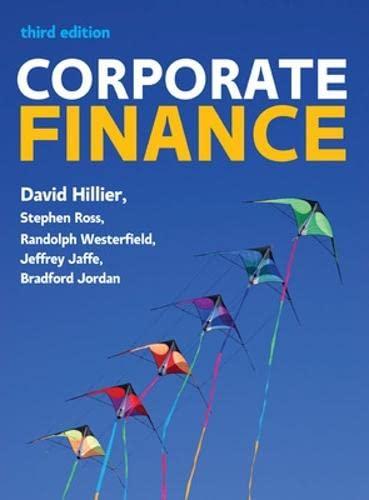Max Gruber graduated from university 6 years ago with a finance undergraduate degree. Although he is satisfied
Question:
Max Gruber graduated from university 6 years ago with a finance undergraduate degree.
Although he is satisfied with his current job, his goal is to become an investment banker. He feels that an MBA would allow him to achieve this goal. After examining schools, he has narrowed his choice to either Universität des Geschäfts in Austria or Financez l’École d’affaires in France. Although internships are encouraged by both schools, to get class credit for the internship, no salary can be paid. Other than internships, neither school will allow its students to work while enrolled in its MBA programme.
Max currently works at the money management firm of Huber and Bauer. His annual salary at the firm is €75,000 per year, and his salary is expected to increase at 3 per cent per year until retirement. He is currently 28 years old and expects to work for 35 more years. His current job includes a fully paid health insurance plan, and his current average tax rate is 50 per cent. Max has a savings account with enough money to cover the entire cost of his MBA programme.
The Business School at Universität des Geschäfts is one of the top MBA programmes in Europe. The MBA degree requires 2 years of full-time enrolment at the university. The annual tuition is €60,000, payable at the beginning of each school year. Books and other supplies are estimated to cost €2,500 per year. Max expects that after graduation from Universität des Geschäfts, he will receive a job offer for about €125,000 per year, with a €25,000 signing bonus. The salary at this job will increase at 4 per cent per year. Because he will be working in Austria, his average income tax rate will remain at 50 per cent.
The Financez l’École d’affaires began its MBA programme 16 years ago. The Financez l’École d’affaires is smaller and less well known than the Universität des Geschäfts.
However, the school offers an accelerated, one-year programme, with a tuition cost of €75,000 to be paid upon matriculation. Books and other supplies for the programme are expected to cost €3,500. Max thinks that he will receive an offer of €92,000 per year upon graduation, with a €10,000 signing bonus. The salary at this job will increase at 3.5 per cent per year. Because he will be working in France, Max’s average tax rate at this level of income will be 41 per cent.
Both schools offer a discounted health insurance plan that will cost €3,000 per year, payable at the beginning of the year. Max also estimates that room and board expenses will cost €20,000 per year at either school. The appropriate discount rate is 6.5 per cent.
1. How does Max’s age affect his decision to get an MBA?
2. What other, perhaps non-quantifiable factors affect Max’s decision to get an MBA?
3. Assuming all salaries are paid at the end of each year, what is the best option for Max – from a strictly financial standpoint?
4. Max believes that the appropriate analysis is to calculate the future value of each option.
How would you evaluate this statement?
5. What initial salary would Max need to receive to make him indifferent between attending Universität des Geschäfts and staying in his current position?
6. Suppose, instead of being able to pay cash for his MBA, Max must borrow the money. The current borrowing rate is 5.4 per cent. How would this affect his decision?
Step by Step Answer:

Corporate Finance
ISBN: 9780077173630
3rd Edition
Authors: David Hillier, Stephen A. Ross, Randolph W. Westerfield, Bradford D. Jordan, Jeffrey F. Jaffe





